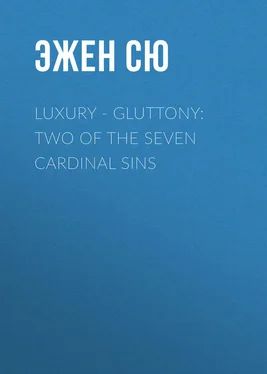Эжен Сю - Luxury - Gluttony - Two of the Seven Cardinal Sins
Здесь есть возможность читать онлайн «Эжен Сю - Luxury - Gluttony - Two of the Seven Cardinal Sins» — ознакомительный отрывок электронной книги совершенно бесплатно, а после прочтения отрывка купить полную версию. В некоторых случаях можно слушать аудио, скачать через торрент в формате fb2 и присутствует краткое содержание. Жанр: literature_19, foreign_antique, foreign_prose, на английском языке. Описание произведения, (предисловие) а так же отзывы посетителей доступны на портале библиотеки ЛибКат.
- Название:Luxury - Gluttony: Two of the Seven Cardinal Sins
- Автор:
- Жанр:
- Год:неизвестен
- ISBN:нет данных
- Рейтинг книги:4 / 5. Голосов: 1
-
Избранное:Добавить в избранное
- Отзывы:
-
Ваша оценка:
- 80
- 1
- 2
- 3
- 4
- 5
Luxury - Gluttony: Two of the Seven Cardinal Sins: краткое содержание, описание и аннотация
Предлагаем к чтению аннотацию, описание, краткое содержание или предисловие (зависит от того, что написал сам автор книги «Luxury - Gluttony: Two of the Seven Cardinal Sins»). Если вы не нашли необходимую информацию о книге — напишите в комментариях, мы постараемся отыскать её.
Luxury - Gluttony: Two of the Seven Cardinal Sins — читать онлайн ознакомительный отрывок
Ниже представлен текст книги, разбитый по страницам. Система сохранения места последней прочитанной страницы, позволяет с удобством читать онлайн бесплатно книгу «Luxury - Gluttony: Two of the Seven Cardinal Sins», без необходимости каждый раз заново искать на чём Вы остановились. Поставьте закладку, и сможете в любой момент перейти на страницу, на которой закончили чтение.
Интервал:
Закладка:
Eugène Sue
Luxury--Gluttony: Two of the Seven Cardinal Sins
MADELEINE
LUXURY
CHAPTER I
The palace of the Élysée-Bourbon, — the old hôtel of the Marquise de Pompadour, — situated in the middle of the Faubourg St. Honoré, was, previous to the last revolution, furnished, as every one knows, for the occupancy of foreign royal highnesses, — Roman Catholic, Protestant, or Mussulman, from the princes of the German confederation to Ibrahim Pacha.
About the end of the month of July, in a year long past, at eleven o'clock in the morning, several young secretaries and gentlemen belonging to the retinue of his Royal Highness, the Archduke Leopold Maximilian, who had occupied the Élysée for six weeks, met in one of the official parlours of the palace.
"The review on the Field of Mars in honour of his Royal Highness is prolonged," remarked one of the company. "The audience of the prince will be crowded this morning."
"The fact is," replied another, "five or six persons have already been waiting a half-hour, and monseigneur, in his rigorous military punctuality, will regret this enforced delay."
Then one of the doors opened; a young man not more than twenty years old at most, a guest of the house, crossed the parlour, and entered an adjoining chamber, after having saluted, with mingled kindness and embarrassment, the speakers, who rose upon seeing him, thus testifying a deference which seemed unwarranted by his age and position.
When he had disappeared, one of the gentlemen, alluding to him, said:
"Poor Count Frantz, always so timid! A young girl of fifteen, just out of the convent, would have more assurance! To look at him, who would believe him capable of such rare bravery, and that, too, for three years in the Caucasus war? And that he came so valiantly and brilliantly out of that duel forced on him in Vienna? I, gentlemen, picture to myself Count Frantz modestly dropping his eyes as he gave the Circassians a thrust of his sword."
"Besides, I believe that his Royal Highness makes a decided convenience of the ingenuousness of his son — "
"The devil! No indiscretion, dear sir!"
"Let me finish, please. I say that monseigneur makes a convenience of the unconquerable ingenuousness of his godson."
"Well and good. And I think with you that the prince does not see this handsome boy exposed to the temptations of wicked Paris, without some anxiety. But what are you smiling at, my dear sir?"
"Nothing."
"Do you think that Count Frantz has had some love affair, in spite of his apparent innocence?"
"You can see after a little, gentlemen, all the fine things a smile may mean, for I call you to witness I am satisfied with smiling."
"Seriously, my dear sir, what do you think of Count Frantz?"
"I think nothing, I say nothing, I shall be as mute as a diplomatist whose interest it is to keep silent, or as a young officer of the noble guards when he passes, for the first time, under the inspection of monseigneur."
"The truth is, the prince has a glance which intimidates the boldest. But to return to Count Frantz."
This conversation was interrupted by a number of persons who entered the official chamber.
The newcomers banished the thought of Count Frantz, and two or three voices asked at once:
"Well, what about your sightseeing? Is this famous manufactory in the Faubourg St. Marceau worth the trouble of a visit?"
"For my part, gentlemen, I am always very curious about the construction of machinery," replied one who had just entered. "The whole morning has been interesting, and I declare M. Charles Dutertre, the proprietor of this factory, one of the most accomplished and intelligent machinists that I know, besides being a most agreeable man; I intend to persuade monseigneur to visit his workshops."
"Well and good, my dear sir; we will not accuse you of wasting your time in frivolities, but I have not such high pretensions, and my pretension is only in a state of hope."
"And what hope?"
"To be invited to dine with the celebrated Doctor Gasterini."
"The most illustrious, the most profound gourmand of Europe."
"They say, really, that his table is an ideal of the paradise of gourmands."
"I do not know, alas! if this paradise will be as open to me as the other, but I hope so."
"I confess my weakness. Of all that I have seen in Paris, what has most charmed me, fascinated me, dazzled me, I will even say instructed — "
"Well, is what?"
"It is — our proud and modest Germany will blush at the blasphemy — it is — "
"Do finish!"
"It is the Mabille ball!"
The laughter and the exclamations provoked by this frank avowal lasted until one of the secretaries of the archduke entered, holding two letters in his hand, and saying, gaily:
"Gentlemen, fresh news from Bologna and Venice!"
"Bravo, my dear Ulrik, what news?"
"The most curious, the most extraordinary in the world!"
"Really?"
"Quick, tell us, dear Ulrik."
"In the first place, Bologna, and Venice afterward, have been for several days in a state of incredible agitation, for reason of a series of events not less incredible."
"A revolution?"
"A movement of young Italy?"
"Perhaps a new mandate from the papal defender?"
"No, gentleman, it concerns a woman."
"A woman?"
"Yes, if it is not the devil, which I am inclined to believe."
"Ulrik, you are putting us to entreaty, do explain."
"Do you remember, gentlemen, last year, having heard in Germany that young Mexican widow, the Marquise de Miranda, spoken of?"
"Zounds! the one whom our poet, Moser-Hartmann, wrote of in such magnificent and passionate verse, under the name of the modern Aphrodite."
"Ah, ah, ah, what a charming mistake!" said one of the inquirers, roaring with laughter. "Moser-Hartmann, the religious and soulful poet, the chaste poet, pure and cold as the immaculate snow, sings Aphrodite, in burning verses. I have heard those admirable verses repeated, but, evidently, they are the production of another Hartmann."
"And I assure you, my dear sir, and Ulrik will confirm it, that this poem, which they say rightfully ranks with the most beautiful odes of Sappho, is truly the work of Moser-Hartmann."
"Nothing more true," replied Ulrik. "I heard Moser-Hartmann recite the verses himself, — they are worthy of antiquity."
"Then I believe you, but how do you explain this sudden incomprehensible transformation?"
"Ah, my God! This transformation which has changed a cold, correct man, but a man of estimable talent, indeed, a man of genius, full of fire and power, whose name is renowned through Europe — this transformation has been wrought by the woman whom the poet has praised, by the Marquise de Miranda."
"Moser-Hartmann so changed? I would have thought the thing impossible!"
"Bah!" replied Ulrik, "the marquise has done several things, and here is one of her best tricks, written to me from Bologna. There was there a cardinal legate of the Pope, the terror and aversion of the country."
"His name is Orsini, a man as detestable as he is detested."
"And his exterior reveals his nature. I saw him in Lombardy. What a cadaverous, sinister face! He always seemed to me the very type of an inquisitor."
"Well, the marquise took him to a ball at the Casino in Bologna, disguised as a Hungarian hussar!"
"The cardinal legate as a Hungarian hussar!" cried the company, in one voice.
"Come, Ulrik, you are telling an idle tale."
"You can read this letter, and when you see who signs it you will doubt no longer, skeptical as you are," replied Ulrik. "Yes, the marquise made Orsini accompany her so disguised; then, in the midst of the dance, she tore his mask from his face and said, in a loud voice: 'Good evening, Cardinal Orsini,' and, laughing like a crazy woman, she disappeared, leaving the legate exposed to the hoots and hisses of the exasperated crowd. He would have run some danger if his escort had not protected him. The next day Bologna was in a stir, demanding the dismissal of Orsini, who, after two days of excitement, was forced to leave the city by night. In the evening every house was illuminated for joy, and my correspondent says the monogram of the marquise was seen on many transparencies."
Читать дальшеИнтервал:
Закладка:
Похожие книги на «Luxury - Gluttony: Two of the Seven Cardinal Sins»
Представляем Вашему вниманию похожие книги на «Luxury - Gluttony: Two of the Seven Cardinal Sins» списком для выбора. Мы отобрали схожую по названию и смыслу литературу в надежде предоставить читателям больше вариантов отыскать новые, интересные, ещё непрочитанные произведения.
Обсуждение, отзывы о книге «Luxury - Gluttony: Two of the Seven Cardinal Sins» и просто собственные мнения читателей. Оставьте ваши комментарии, напишите, что Вы думаете о произведении, его смысле или главных героях. Укажите что конкретно понравилось, а что нет, и почему Вы так считаете.












